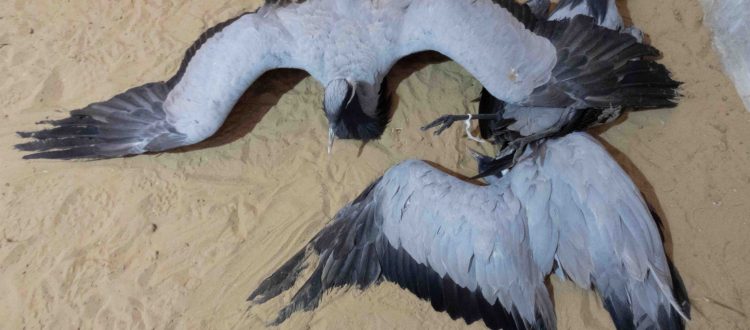WTI team on ground as Avian Flu hits Demoiselle Cranes in Rajasthan
15 November 2021, Jodhpur: More than 150 Demoiselle Cranes (Grus virgo) have been reported dead in the latest incidence of Avian Flu in Rajasthan. With the numbers still on the rise, the whole state is on high alert. IFAW-WTI’s Emergency Response Network (ERN) was mobilised along with its local partner Raksha Jaipur who have been on ground, since the first report of affected birds on the 6th of November, 2021.
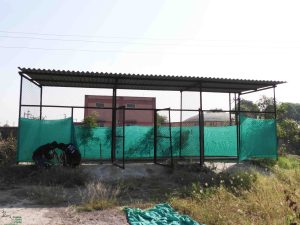
Pic credits: Snehaa Sundaram/WTI
An annual cycle of death?
In 2020 winters, Rajasthan reported deaths of more than 250 crows while more were reported from neighbouring states like Madhya Pradesh due to Bird Flu, as documented by the publication Down to Earth.
Back in 2019, around the same time of the year, more than 18,000 resident and migratory birds in the Sambhar Lake in Rajasthan, died due to Avian Botulism. It was a tragedy that took epic proportions and WTI’s ERN teams rushed to rescue and treat the affected birds. This time around too, the implications look similar as the cranes have flown the first site and more deaths are reported from locations 50 km away.
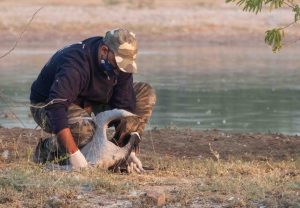
Pic credits: Snehaa Sundaram/WTI
The epicentre this time is Jodhpur District, in Western Rajasthan. Based on the samples that were sent, the National Institute of High Security Animal Diseases has confirmed the cause as H5N1 virus. Following the announcement, all states are on high alert, especially the Bharatpur Bird Sanctuary, which is just about 500 kilometres from the current epicentre.
WTI’s Disaster Response
As on today, the virus has affected only Demoiselle Cranes, locally called the “Kuranja”. The first report came from Kaparda wetlands on the 6th of November, with 56 cranes found dead and several others showing signs of sickness. Having responded to such cases in the past, team members of Raksha and WTI were prepared for yet another wildlife emergency. After prompt coordination with the Rajasthan Forest Department, a team of veterinarians, rescuers, animal handlers and coordinators were mobilized on the ground.
About 130 sick birds were admitted to the emergency shelter established about 5 km away from the disaster site. The symptoms were head drooping, opisthotonos, gasping, increased rectal temperature followed by hypothermia, unilateral or bilateral wing dropping, haemorrhage in the eye (with some showing a whitish blue film over the cornea), anorexia, dehydration, diarrhoea and immobility. Most of the rescued birds have died in captivity while the team has been able to stabilize 6 birds, in-situ.
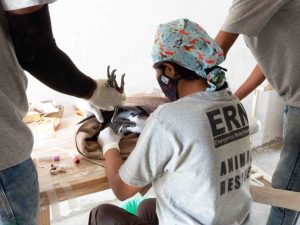
Pic credits: Snehaa Sundaram/WTI
Depending on the symptoms, the birds were provided supportive therapy. This included administration of temperature controlled intravenous fluids, probiotics, antibiotics, multivitamins, immune-modulators, sling physiotherapy and bronchodilators (for severe dyspenic individuals). Makeshift enclosures were constructed by the team where the birds were being kept in a warm environment. Individuals that were admitted with non-critical symptoms are already showing signs of improvement to the extent of picking up their own food. However, all the admitted birds have been retained in isolation since the flu virus can spread via droppings, even after recovery.
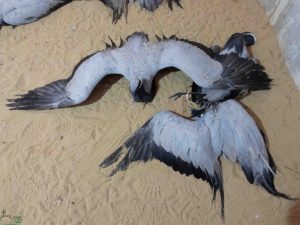
Pic credits: Snehaa Sundaram/WTI
Ongoing preparedness
Now that the cause of the deaths has been confirmed, it is critical that all sick birds are properly managed to minimize the risk of the spread. Also, considering the communicable nature of the virus, the rescue and rehabilitation effort has been put on hold. This morning, 136 more cranes were found dead and 15 have been caught with mild symptoms at Sardar Samand Lake in Pali district, 42 kilometres from the Kaparda Wetlands. With a disaster looming, the only hope lies in minimising the spread by implementing control measures on ground. As of now, our ERN team is on standby, waiting for the official protocols to be released and is working with the forest department to best address the spread and management of the virus.

